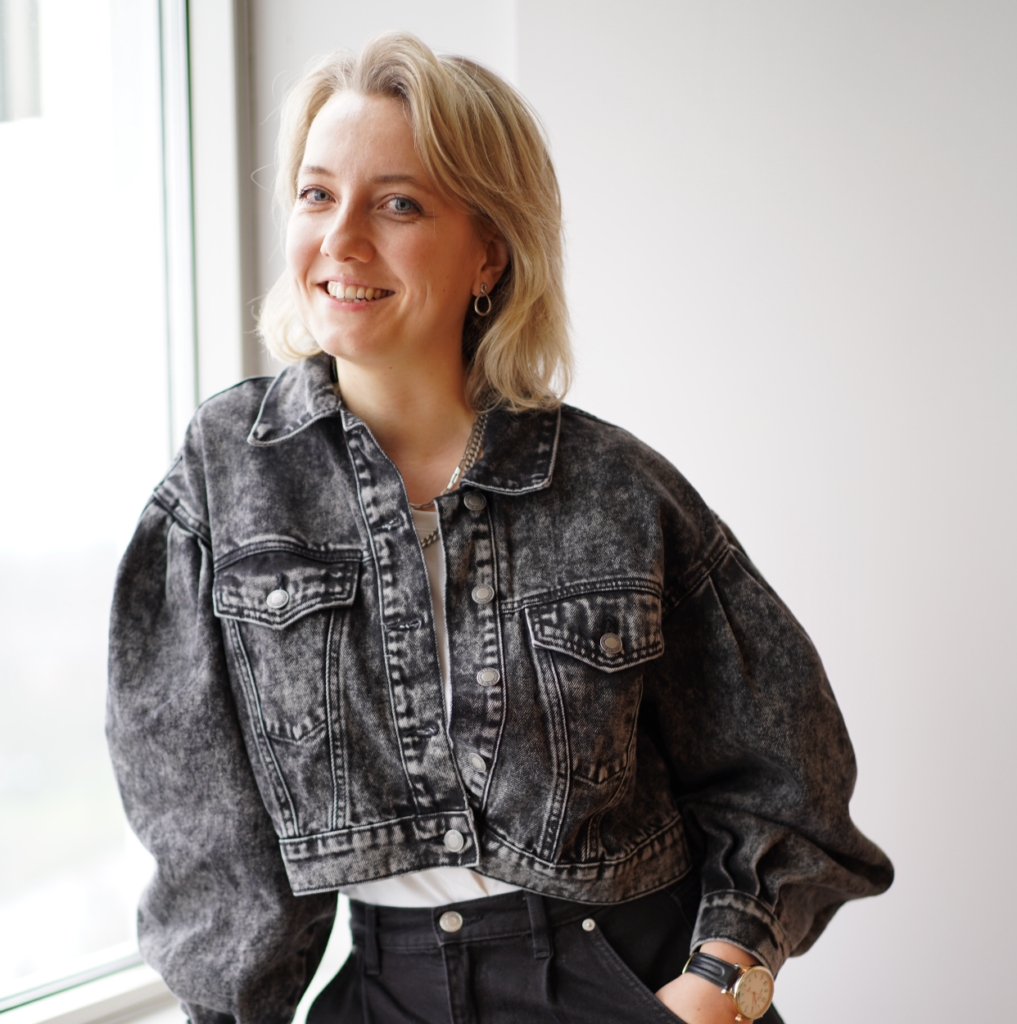
MYSTORY With …
Oxana
34 Years, Hamburg
“Once you were in, this parallel world opened
up where everyone knew each other and you
were allowed to be whoever you wanted. …”
Published: May 2022
Parallel Worlds
I come from Russia – the country that today is associated with war, violence, propaganda and homophobia. And it’s hard to believe that in my youth, in the 2000s, I experienced probably the most liberal and free time of this country. That was the time when the pop duo “t.A.T.u.” became famous in Europe and in the USA. At that time in Russia no one was bothered by two girls kissing on stage. Many girls then walked hand in hand in the streets in short skirts, like in the video All The Things She Said. There were also other Russian artists who made homosexual references in their songs and videos. I grew up with that.
When I was a student, I knew that homosexuality existed, but I didn’t identify with it. I always had close relationships with my girlfriends, even held hands and slept in the same bed. It was all harmless and felt normal. I also knew that in a parallel class there were some girls who were supposedly into women. It was only whispered about (later I saw them at lesbian parties). When I met a girl at a summer camp and felt jealous every time she talked about boys, I couldn’t place my feelings.
I didn’t realize the fact that I was into women until I was 17, after a young woman approached me in a heterosexual club and wanted to get to know me. I dated her for about a year after that and we still keep in touch (today she lives in San Francisco with her wife and child). She introduced me to the lesbian community.
The LGBT*IQ community in my hometown (population about 2 million) was quite big at that time, there was a club for lesbians and one for gays with weekly parties. In Moscow and Saint Petersburg, of course, there was more: more clubs, more parties, more people like us, but we were happy with what we had. Of course, none of this was public and you had to know your way around, but once you were in, this parallel world opened up where everyone knew each other and you were allowed to be whoever you wanted.
That’s where I found my soul mates, my best friends. I loved this parallel world, even though it wasn’t perfect either.
I was a student, had little money, lived with my parents, who raised me liberally but didn’t know about my sexual orientation at the time. While I felt so comfortable in the community, the outside world became less and less tolerant – but I didn’t realize that until later.
At the end of 2008, I came to Germany to study, without knowing how long I would stay … 14 years later, I’m still here, happily married to my wife and with a great job, leading the life I always wanted. I feel free and safe in Germany. I am grateful for all the experiences I have had and all the people I have met. I am grateful for the time I experienced in Russia and I know that nowadays it is unimaginable and sometimes even dangerous to walk hand in hand there. Nevertheless, I wish all LGBT*IQ people to find their way early and have only the positive encounters. To those who don’t dare yet, I can only say: “Don’t be afraid, you are normal and not alone!”
Dear Oxana, Thank you very much for YourStory!
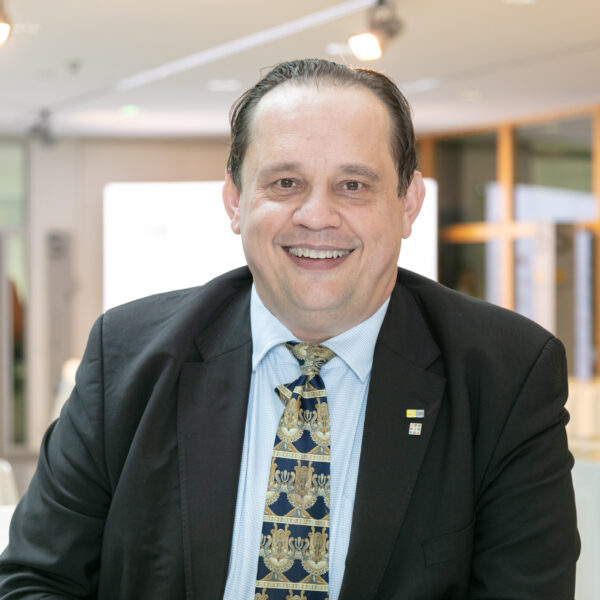
MYSTORY With …
Jean-Luc
55 Years, Frankfurt
“My parents and grandparents taught me that
belonging to a minority has a positive value
and is something to be proud of. …”
Published: May 2022
The Power of rooTs.
For me and my involvement in the LGBT*IQ community, my roots and my origin are very important . Since birth, I belong to a minority in France, as a Protestant in a very Catholic country. We Protestants represent about 2 million citizens, less than 3% of the French population. We are a strong community, very involved in society, politics, associations and economy.
My parents and grandparents taught me that belonging to a minority has a positive value and is something to be proud of. I also learned as a child that solidarity within and outside one’s community is essential – and that one should help others who are suffering or rejected, no matter who they are.
Protestants have also been discriminated against in the past, especially in the 17th/18th centuries, just because of their faith. My family experienced this discrimination just like other Protestant families. For example, we were not allowed to bury our dead in the cemetery in the past, so every Protestant family had a small cemetery on their property. From such experiences, we know what discrimination feels like – and that explains why we Protestants helped many Jews during World War II, for example. So I learned that I have to stand up against any kind of discrimination in the whole society.
For generations, members of my family have been involved in the church and in local politics, for example. In the Lutheran Church, church affairs are decided and administered by a synod, a group of people made up of 50% clergy and 50% church members. My father was a member of our church’s synod for over 20 years. My parents and grandparents were also very active in the unions. And I am the first in my family to help start a foundation, which they are very proud of.
I saw from a young age how important and rewarding it is to be socially involved, to have time for others, and that it is possible to make positive changes.
… About 23/24 years ago, I had my Coming Out and met the first big love of my life. This gave me a lot of strength and self-esteem, which brought about many changes in my life. I left the university world to start my career at Deutsche Bank – and also my social commitment.
Then, in 2000, I was lucky enough to be invited to the founding event of dbPride, Deutsche Bank’s LGBT*IQ network – that was the beginning of everything!!!
From the beginning, more than 20 years ago, until today, my upbringing and roots have been the key and main driving force for my commitment to the LGBT*IQ community – and beyond … for a more respectful and tolerant society.
Dear JEan-Luc, Thank you very much for YourStory!
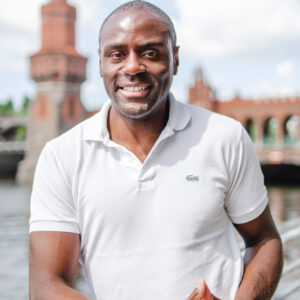
MYSTORY With …
Louis
42 Years, Berlin
“Despite all difficulties, I found the
courage in my 20s to acknowledge
all facets of my identity …”
Published: May 2022
Being QPOC.
As a QPOC in this mostly heteronormative-cisgender, white environment, I learned very quickly to identify (un)conscious oppressive phenomena in order to navigate the world (relatively) safely. It was simply a matter of survival – at least it seemed that way to me at the time, often rightly so. Despite all these difficulties, I found the courage in my 20s to acknowledge all facets of my identity – thanks to the support of QPOC friends I met in the activist scene and whose stories motivated me.
Shortly after coming out, I had the opportunity to move to Cologne to continue my studies. Like all my peers in one of the queerest strongholds in the country, I went to one of the numerous discos one night. There, a (white) man came up to me smiling, but spoke to me in English. Although I kept talking German, he always answered in English, which irritated me a bit because his German accent was easy to recognize. The gentleman was polite, nice, offered me a drink. Although the conversation was quite pleasant, it was clear to me that despite his interest, nothing more would come of it. Quite politely, I then showed him that I wanted nothing with him except for a friendly chat. Suddenly, out of nowhere came the statement that completely threw me off:
“Why do you have to play hard to get, when a white man is interested in you?”
My jaw dropped … I was flabbergasted. The man shook his head and walked away. He probably thought my stunned reaction was because I was offended that he had suddenly lost all interest in me – and not because of the racist connotation of his statement …
At first, I thought this was an isolated incident. Our shared experiences as queer people had made us similarly minded people who could put ourselves in the shoes of any minority better than anyone else, I thought naively. How could people who, like me, had experienced exclusion and discrimination have the audacity to shamelessly express such things in public? It was simply inconceivable to me at the time, let alone understandable … until other QPOC friends told me similar, sometimes more horrific stories over time. That’s when I had to come to the realization that the queer community (especially the male-dominated mainstream), in addition to the long identified issues of sexism and transphobia, is unfortunately plagued by racism, despite all the denial and whining. And (un)consciously perpetuates the racist (but also sexist) mechanisms of oppression in general society. This imbalance in power relations is also reflected in the workplace in my interactions with other (white) queer colleagues.
Therefore, the next big challenge for the LGBT*IQ community is to continue these discussions and the work derived from them in a more intersectional way. I do this every day, both in my role as D&I manager and in my personal sphere, because there is indeed still an insane amount of work to be done in this area …
Dear Louis, Thank you very much for YourStory!
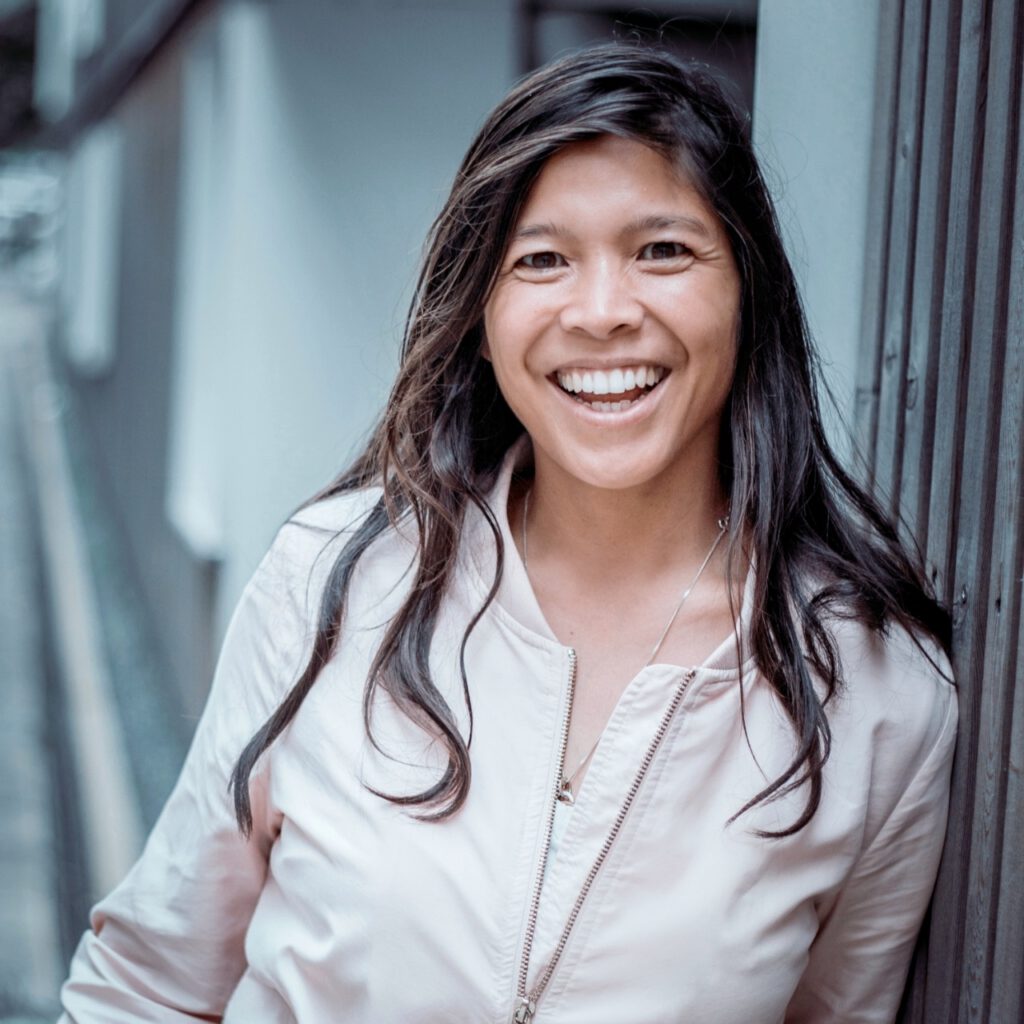
MYSTORY With …
Jannette
38 Years, Hamburg
“It is important to speak up and be a role model to young
people. I would love the next generation to be even more
progressive when it comes to diversity and inclusion. …”
Published: May 2022
Role Models
I grew up in a very Catholic Filipino family. Being a lesbian was not an option for us – on the contrary, my parents considered it a “punishment from God”.
On my way to coming out, there were a few role models in my life, starting with this one girl in high school during my exchange year in New Jersey. She played on my basketball team, was openly lesbian … and didn’t make a big deal about it. I always admired her strength and courage. She was an inspiration to me.
My older brother is gay, and I came out a few years after him. After my brother came out, my parents moved from Germany to California. I was 17 at the time, preparing for my final exams, had my circle of friends here, and decided to stay in Bonn.
Six years later, I told my father that I was in a very happy relationship with a woman. His response was: “This is God’s way of punishing me.” I was very disappointed with his reaction.
It took about 10 years for my parents to accept that my brother and I were homosexual.
When I got married, my parents didn’t come. Only when we had our two daughters my parents resumed contact. A few years later, my then wife Mareike and I decided to separate but continue to be good parents. Living with my new wife and explaining this to my parents felt to them like my second coming out, which destroyed their ideal world. Fortunately, this time it didn’t take 10 years for them to accept my decision.
Today, my parents get along very well with my brother’s and my partners. My wife Mina, the children and I live in Hamburg and have close contact with my ex-wife. I think it’s great to see what kind of development my traditional parents have made in the last few years.
Many people have helped me on my way to coming out. For example, my ex-wife Mareike, who taught me to be self-confident. She encouraged me to speak my mind and fight for things I believe in. My wife Mina, who encourages me to do all the things I truly believe in and loves me for who I am. My children who inspire me every day. It is important to speak your mind and be a role model for young people. I want the next generation to be even more progressive when it comes to diversity and inclusion.
My company allows me to be who I am. That influences my work. I couldn’t work for a company that forces me to hide who I am. Authenticity is the key.
Dear Jannette, Thank you very much for YourStory!
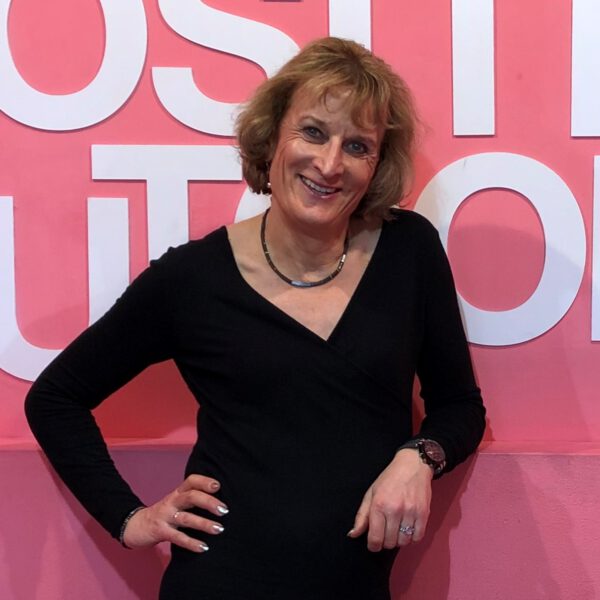
MYSTORY With …
Manuela
62 Years, Bonn
“When I saw a documentary about a trans* woman on television
for the first time in the 90s, I was gripped by defensiveness,
fascination and insatiable longing in equal measure. …”
Published: May 2022
MY LATE COMING OUT AS A TRANS* WOMAN…
At the age of 5, I noticed for the first time that “something was wrong” with me, when I was filled with a bright feeling of joy at being mistaken for a girl – at the same time I was confused and ashamed about it. Never would I have wanted to talk about it to anyone, just as I would never have wanted to talk about how beautiful I thought it was to secretly wear my mother’s wedding dress in the attic. Other hidden feminine preferences developed, at the same time combined with a strong aversion to male-typical behavior. I steadfastly refused to wear suits or ties or to undress in front of other boys in the locker room during sports. On the other hand, I wanted to be accepted and not ridiculed.
So I deliberately took up masculine hobbies and did everything else to hide my developing feminine inner self from others.
Girls always fascinated me – I admired them, wanted to be like them and fell in love with them. I found the love of my life at 19, to whom I am still married and have 3 wonderful children. Unfortunately, my attempt to tell about my inner feelings was brusquely dismissed by my then girlfriend and so I remained alone with my hidden feelings and the female parallel world that was building up inside me for decades.
When I saw a documentary about a trans* woman on television for the first time in the 90s, I was gripped by defensiveness, fascination and insatiable longing in equal measure. It was clear to me that a mirror was being held up to me. On the other hand, I felt inner resistance, because I saw the consequences and dangers if I gave in to my desires. So I imposed a ban on gathering information on myself, which I kept up for more than 20 years, until the topic of transgender became so present in the media that I gave in and began an Internet search, which confirmed my suspected self-diagnosis of “transident” after a very short time.
After that my thoughts circled only around my transsexuality and I understood that there was no way around my coming out. Starting with my wife and my children, I opened up to friends and a few good colleagues and was very surprised about the largely positive reactions and support offered, as the stories on the Internet were mostly characterized by personal disasters. This also applied to the professional life, where I was not aware of a single comparable case at my employer RWE, which caused me particular anxiety. So I firmly expected to lose my professional and human reputation as well as to be ostracized and ridiculed in this male-dominated, at that time (as I thought at least) quite conservative company.
But things turned out quite differently. First of all, I ran into an open door in the Diversity department when I asked them for support for my plans to make the transition to becoming a woman at work. Finally, someone at RWE was openly admitting to being transgender by name and face, I was told, and together we worked out a plan for coming out at work, for which I gained support all the way up to the Executive Board. After personally informing a few colleagues and superiors in advance, with whom I had a special relationship, our board of directors sent an e-mail to its managers during my vacation, who in turn distributed it to their employees.
To my delight, I received warm and supportive messages while still on vacation, so that my worries about the reactions of my colleagues melted away like snow in the sun! Numerous other outing conversations followed with people who were personally important to me and with whom I placed particular value on them understanding my story and accompanying me on my journey! However, it should also be mentioned that I lost some friends who did not want to follow my transformation, but in their place I was able to meet wonderful new people.
It was also hard for my closest family, but we stuck together and walked the sometimes rocky road together.
At RWE, we got in touch with another trans* woman, a gay colleague joined us and we founded the LGBTIQ & Friends Network at RWE, which now has 225 members. In addition to warm friendship, we are now united by the goal of making it easier for other members of the LGBTIQ community to come out at work. To this end, we provide assistance and advice and are in close contact with other companies and LGBT*IQ networks in Germany.
Dear Manuela, Thank you very much for YourStory!
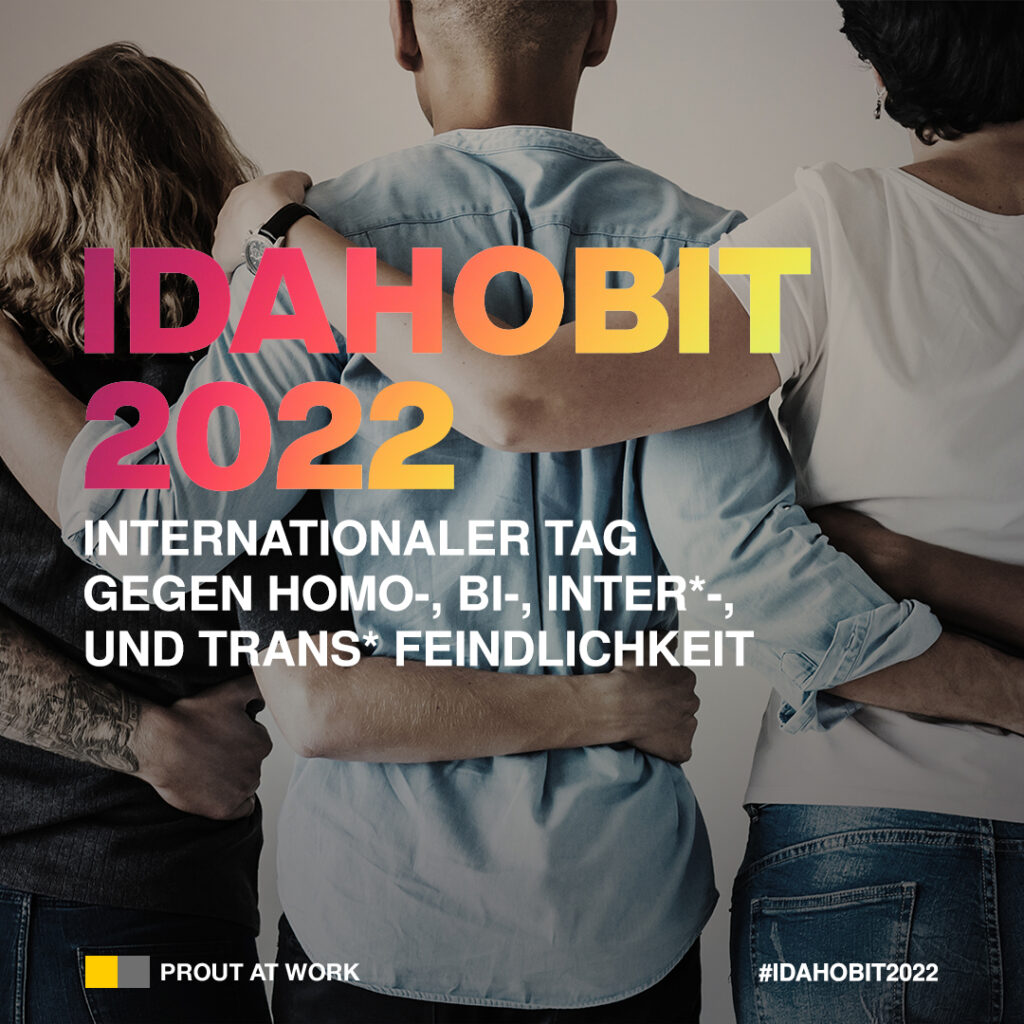
This Year’s IDAHOBIT and #MyStory
The International Day against Homophobia, Bi-, Inter- and Transphobia (IDAHOBIT) has been celebrated annually on May 17 since 2005 to highlight discrimination against the LGBT*IQ community, to raise awareness of existing inequality structures and to take a united stand for diversity and tolerance. May 17 marks the day in 1990 when the WHO removed homosexuality from the diagnostic code for diseases.
Today and every day of the year, we want to celebrate the colorful diversity of the LGBT*IQ community and have therefore created the format “MyStory”. The format gives a stage to all the individual stories that queer people experience every day, because we believe that everyone has something inspiring to tell. We start today with four moving stories.
IDAHOBIT 2022
Facts
Studies show that workplace discrimination experiences are still part of everyday life for many LGBT*IQ people. The study “Inter in the Office?!” The work situation of inter* people in Germany under a differential perspective to (endo) LGBTQ+ people.”, published in 2020 by Prof. Dr. Dominic Frohn states that 37.7% of (endo) trans and/or non-binary people surveyed, approx. 30% of inter* respondents and approx. 20& of (endo* cis) LGB+ people directly experience workplace discrimination , in the form of e.g. job rejection, transfer or dismissal.
It’s not surprising, then, that according to a Boston Consulting Group survey (2018/19), 22% of respondents see coming out at work as a potential career risk. 42% would lie to their manager about their sexual orientation and/or gender identity. More background information and studies on LGBT*IQ (in the workplace).
Support
Discrimination against LGBTIQ people is evident at other levels of society besides the workplace. Deal with these issues and make yourself aware of existing inequality structures. Only by becoming aware of these structures and grievances can you actively contribute to their dismantling. The points mentioned here are only an excerpt and not a complete list of possibilities with which you can start your commitment for LGBTIQ equal opportunities and against homophobia, bi-, inter- and transphobia.
Blood Donation
Discrimination against LGBT*IQ people is evident at other levels of society besides the workplace. Deal with these issues and make yourself aware of existing inequality structures. Only by becoming aware of these structures one can actively contribute to their dismantling. The points mentioned here are only an excerpt and not a complete list of possibilities with which you can start your commitment for LGBT*IQ equal opportunities and against homophobia, bi-, inter*- and trans*phobia.
EU LGBT*IQ Freedom Zone
In 2020, some Polish municipalities and cities declared their region as so-called “LGBT-free zones”. The establishment of entire regions where, according to the signatories, no LGBT*IQ people live is a clear attack on lesbian, gay, bisexual, trans and inter* people. As a first step, the European Parliament has declared the EU as an “LGBTIQ Freedom Zone” to send a clear message against the homophobic rhetoric and sentiment against sexual minorities in Poland. Find out more about the current events in this regard.
Selbstbestimmungsgesetz
The currently valid “Transsexuellengesetz” (TSG) is deeply discriminatory and should be replaced by the self-determination law. “The parliamentary group Bündnis 90/Die Grünen has submitted a bill “for the repeal of the transsexual law and introduction of the self-determination law” (19/19755)”.
A basic Law for all
Demand the addition of Article 3 GG, because LGBT*IQ people are still not protected by Article 3 in the German Basic Law. Many people within the LGBT*IQ community experience discrimination, exclusion and hate violence. We feel that a protection by the Basic Law is indispensable and therefore PROUT AT WORK is one of the first signatories of the appeal “A Basic Law for All”. Sign also now the petition or contact your delegates.
Legal Equality for queer Families
Stand up for the rights of rainbow families. Compared to children of heterosexual couples, the second mother must first adopt her child to provide legal protection – even if the parents are married. For example, support the nodoption campaign, which opposes stepchild adoption among rainbow families and advocates for recognition of parenthood.
MyStory
We collect stories that move, entertain, inspire. Read our first four stories today and look forward to many more!

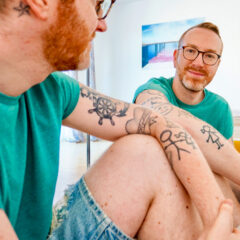


Counseling
LesMigras
LesMigraS is the anti-discrimination and anti-violence section of lesbian counseling Berlin e.V.”
Gladt e.v.
“GLADT is a self-organization of black and of color lesbians, gays, bisexuals, trans, inter and queer people in Berlin, which stands up against racism, sexism, trans* and homophobia, ableism and other forms of discrimination and offers a diverse range of counseling services.”
Antidiskriminierungsstelle des Bundes
“The counseling team with lawyers can inform you about your rights in a case of discrimination or sexual harassment, show you possibilities if and how you can enforce your rights, strive for an amicable conflict resolution and try to name experts close to your home.”
Bundesverband trans*
“The Bundesverband Trans* (BVT) sees itself as an association of individuals, groups, clubs, associations and initiatives at regional, state and national level, whose common endeavor is the commitment to gender diversity and self-determination and the commitment to human rights in terms of respect, recognition, equality, social participation and health of trans or persons not located in the binary gender system.”
Deutsche Gesellschaft für Transidentität und Intersexualität e.V.
“The dgti has set itself the goal of promoting the acceptance of transidents within society and counteracting their stigmatization. It should advise and support affected and interested persons, if this is desired. An essential aspect of the work should be the (re-)integration of affected persons into the work process, in order to counteract the danger of social decline, which is still associated with social change today. It advocates more openness toward one’s own identity and takes into account the diversity of human existence.”
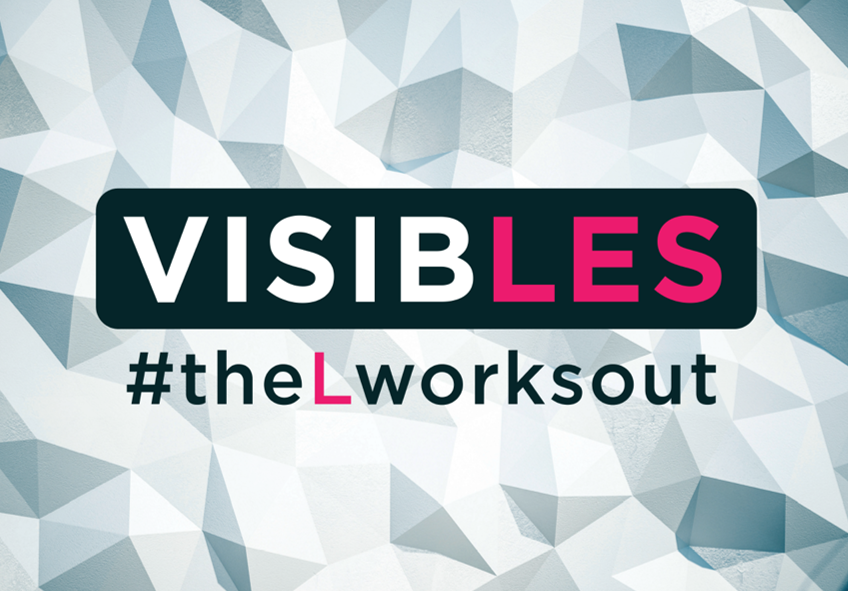
Campaign: #theLworksout for Lesbian Visibility Day
Lesbian persons and also bisexual women are often not perceived, one speaks of Lesbian Invisibility. To this day, there are few visible lesbian role models – especially in the business context. In many networks lesbian persons are in the minority. As a result, there is a lack of role models for new and younger colleagues. Through the cross-network and cross-sector campaign #theLworksout on April 26, we can empower openly lesbian people and together create visibility through a large number of participants, as well as highlight the diversity of lesbian people.
HOW CAN I PARTICIPATE IN THE campaign?
- Inform lesbian people from your own network and beyond to make them aware of the action.
- Create a portrait photo using the templates, whether printed or digitally with the tablet. You are also welcome to use the template in grayscale, for example. (Make sure to clarify in advance whether you are allowed to use the employer’s company logo together with the template. Instead, you can use the company name or use the template without the company name).
- Post your own campaign photo on 26.04. 2022 from 10:00 am with the respective hashtags and taggings on the social media channels you use
Hashtags
#theLworksout
#LesbianVisibilityDay
#LesbianVisibility
#LesbischeSichtbarkeit
#LGBTIQBusinessLadies
#ProutAtWork
#LGBTIQRoleModels
#FlaggeFürVielfalt
Taggings
PROUT AT WORK
Facebook: @PrOut@Work
Instagram: @proutatwork
LinkedIn: @PROUT AT WORK-Foundation
Twitter: @proutatwork
If applicable, own company
Position yourself and your company as a supporter of the campaign and for lesbian visibility and call on employees to participate.
The campaign was initiated jointly by the PROUT AT WORK-Foundation and LGBT*IQ business networks. The Lesbian and Gay Association (LSVD) and Wirtschaftsweiber e.V. support the campaign.
You can also find more helpful information and interviews in our article
on Lesbian Visibility Day 2021.
We look forward to a successful campaign!
If you have any further questions, please do not hesitate to contact us.
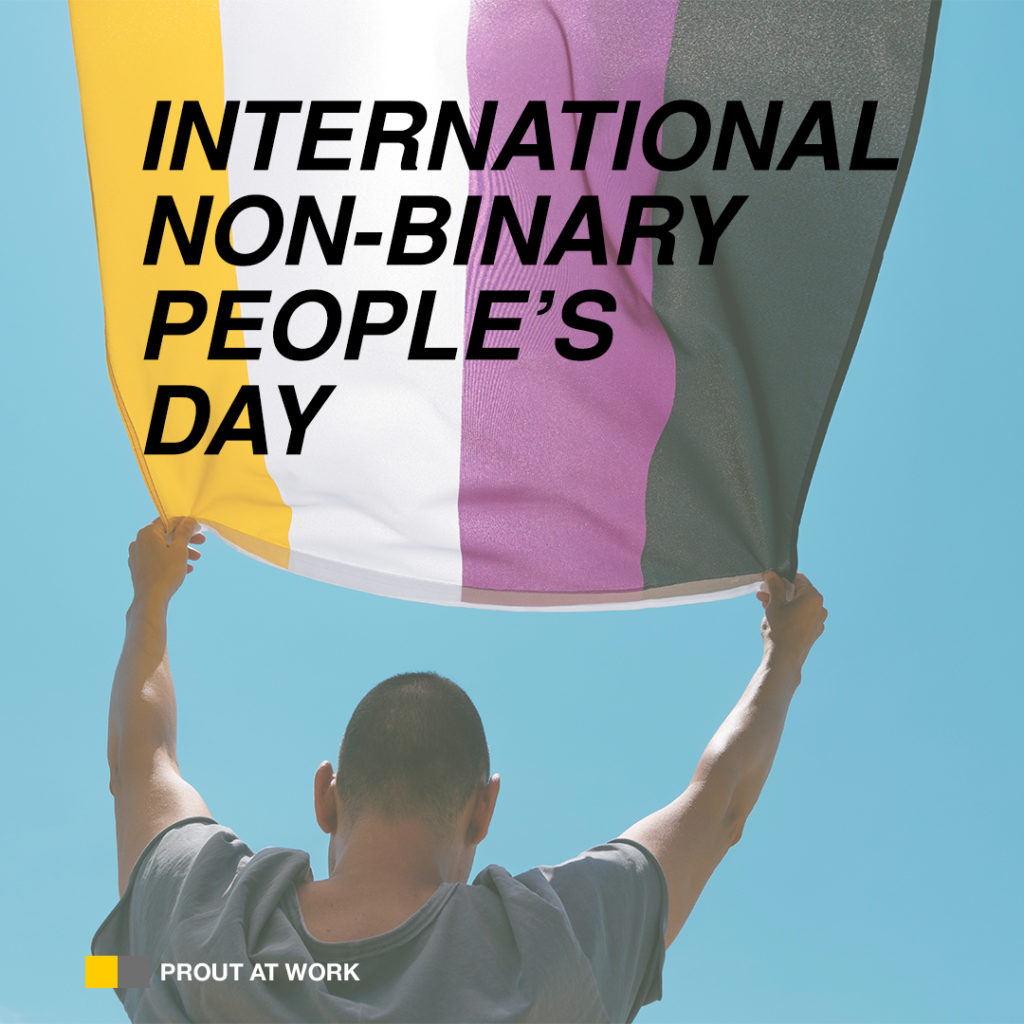
International Non-binary People’s Day has been held on July 14 since 2012. The date falls exactly between International Women’s Day in March and International Men’s Day in November. The day aims to raise awareness of the realities of life for non-binary people and to make issues visible that non-binary people face worldwide.
The terms non-binary, abinary, and genderqueer describe gender identities used by people who locate themselves outside the binary gender system. This includes, for example, agender, demigender and genderfluid people. Non-binary people can also be trans. However, trans people do not automatically assign themselves to a non-binary gender identity.
The symbolism behind the colors of the Non-binary flag:
- Yellow represents locating outside the binary gender system.
- White represents people who identify with multiple genders.
- Purple represents gender fluidity.
- Black represents people who do not identify with any gender.
Jo Labecka (NO PRONOUNS)
PROUT AT WORK-Foundation, Strategy & Corporate Partners
How do you identify and what does that mean to you?
I identify as genderqueer. For me, gender is a performance and a fluid continuum rather than a rigid, binary construct. Accordingly, I see myself outside of the binary system and feel the concept is artificial.
What are your experiences as a non-binary person?
I see my coming out as genderqueer as a kind of social work. An act that contributes to confronting people with the topic of being non-binary for the first time, so that they can deal with it. It is a process of self-discovery, as I discover new aspects of my identity over time and communicate accordingly to those around me. It is not an easy task because many still have little understanding of this topic. That means to show oneself again and again authentically and thus vulnerable, and thus also to have to come to terms with the fact that some try to deny my identity.
How can non-binary people be supported?
In any case, accept the new name of the non-binary person without expressing preference for the use of the old name. If certain pronoun usage is preferred, strive to follow that. In general, do not deny the existence of the non-binary identity, even if the concept is not comprehensible.
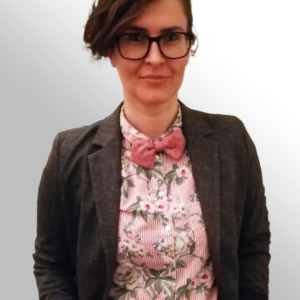
Tips and recommendations
10 Ways To Step Up As An Ally For Non-binary People
Young People Are Taking Control Over Their Gender Identity
Interviews with non-binary Accenture employees (DE)
Learn more about LGBT*IQ in our little LGBT*IQ ABC about terms like gender identity,
sexual orientation or gender expression.
#Rainbowgate
Pride Month ends in a few days and if the past weeks and political decisions, also here in Germany (e.g. Self-Determination Act), haven’t done it yet, the current events around UEFA’s decision make it clear once again that the decisive commitment to LGBT*IQ equal opportunities has to take place 365 days a year and cannot be taken for granted.
It’s no surprise that UEFA has banned the Allianz Arena from being lit up in rainbow colors. Now it has gone one better and turned the tables. In a posting, UEFA interprets the official request by the city of Munich as a political calculation. They themselves understand the rainbow as a non-political sign that is supposed to symbolize their own basic values – the illumination of the Allianz Arena is nevertheless out of the question.
A paradoxical statement that highlights the lack of confrontation with uncomfortable truths and reverses the responsibility for the current situation. With its decision, UEFA shoots itself an own goal – despite the emphasis on political and religious neutrality – because it sets a clear political signal itself. True to the motto: profit before people (lives).
With all the points worth discussing in dealing with #Regenbogengate, however, it should be clear and there is nothing to discuss: Passing laws that deliberately further oppress marginalized people, expose them to violence and make them invisible is a political act and goes against the commitment to human dignity and fundamental rights.
The lighting of the Allianz Arena could have been an important sign for LGBT*IQ people in Hungary, Poland, Germany and worldwide. A sign of solidarity and hope, which, however, must also be followed by action.
LGBT*IQ RIGHTS ARE HUMAN RIGHTS
As a foundation, we therefore also call on the companies involved in the EM to continue to exert pressure, not only today, but every day to show edge and attitude, to position themselves and to draw consequences in the respective countries. Words must be followed by deeds and the commitment for LGBTIQ must be intensified. Because LGBTIQ rights are human rights that are not negotiable.
Finally, a suggestion on the many great ways already mentioned to make the rainbow visible in the stadium tonight: Can’t the sponsor companies like Booking.com, Lieferando, VW, Heineken, FedEx, etc. spontaneously adjust their perimeter advertising?
We are curious about tonight and further reactions and look forward to an interesting and fair game of both teams.
Contact us
If you would like to learn more about our work or have questions about LGBT*IQ in the company, we would be happy to help you by email or phone call.
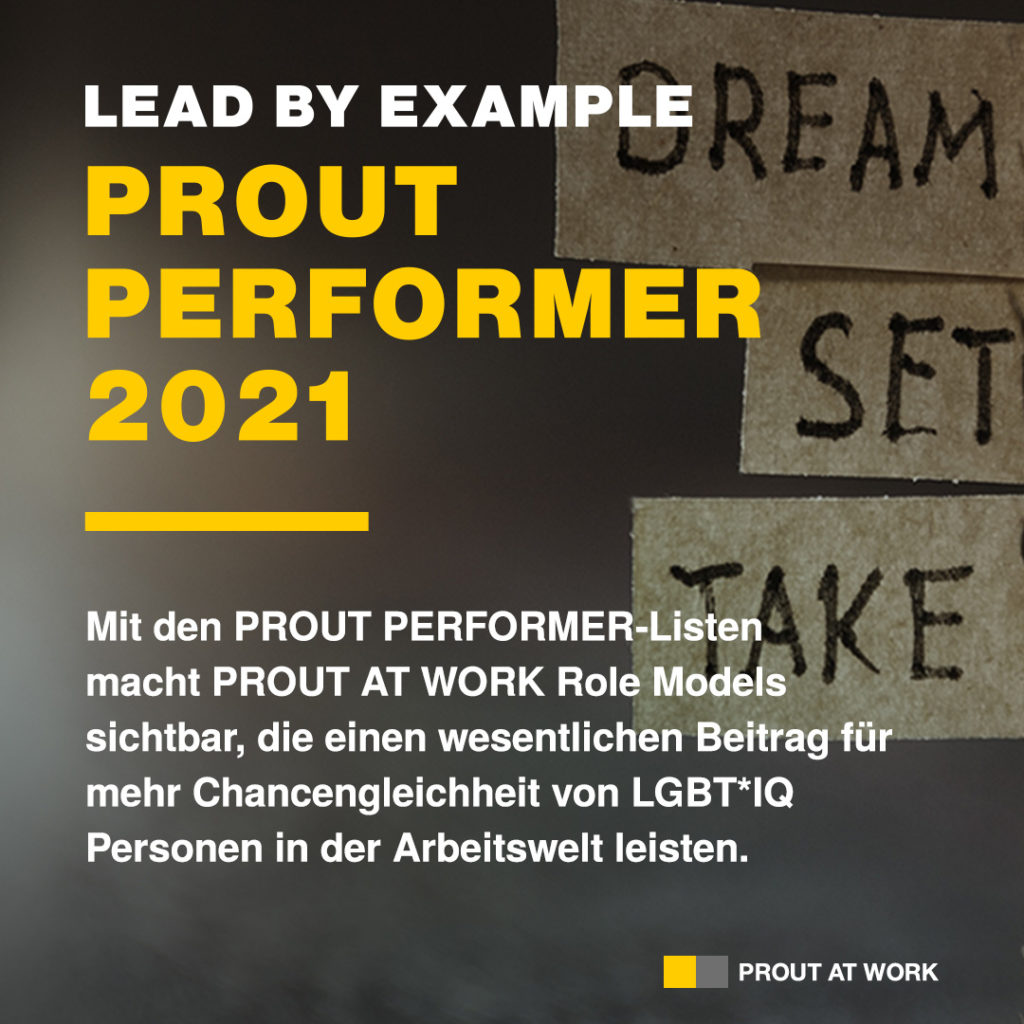
The PROUT PERFORMER lists 2021 are online!
The nomination process already started at the beginning of the year and now the time has finally come! You can now get a glimpse of this year’s PROUT PERFORMER lists and be inspired by impressive individuals and their stories.
